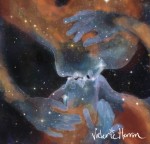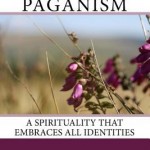Pagans widely agree that fiction has spiritual power. In their interviews of Pagans, Margot Adler (Drawing Down the Moon) and Sarah Pike (Earthly Bodies, Magical Selves) both found that Pagans often cited science fiction or fantasy as important inspirations for their spiritual life. In religious studies scholarship generally, there’s an enormous amount of material on how people have engaged novels, films, and other media for spiritual purposes (one good recent example is Invented Religions; some of my own contributions to this topic include papers on matriarchal Goddess novels, Heinlein and Starhawk, and film as religion). My take has generally focused on how fiction with a spiritual impulse has inspired real-life community practice, followed by individuals re-fictionalizing those community practices in order to better articulate and spread their religious values. As in myth, which tends to focus on spiritual or cultural truth rather than historical truth (though there may be a historical event or person at the core of the tale), Pagans often use fiction to clarify values, describe ecstatic experiences, or articulate hopes in a way that feels spiritually authentic—a purpose for which literal, historical prose accounts are not well designed.
Here at Patheos, we’ve had quite a few posts recently touching on the topic of fiction and Paganism. Sterling, for instance, writes about how the images from a favorite novel allowed her to form a real-life connection to the spirit of a particular river. (Her experience reminds me of the conversation in this blog, where the author argues that the local gods and spirits of a particular place are forced to use images we are familiar with in order to speak to us – such that, while we may seem to be speaking with a deity from across the world, we may actually be relating to a local deity who has clothed hirself in a way designed to get our attention.) Gus diZerega has offered a two-part series on pop culture and the formation of independently acting thought forms, suggesting the power that the media we consume may have on our behavior as individuals and as a society. Sunweaver recently shared about her use of fictional heroes as a way of exploring human virtues, and Aine Llewellyn responded with some reflections on how fiction and pop culture help to inform his work with contacting local and/or previously unknown spirits.
Although I myself have found fiction to be religiously inspiring (especially fiction that includes the worship of historical deities), I largely keep characters derived from pop culture entertainment out of my devotions. There is something compelling in diZerega’s suggestion that given enough attention and energy, a thought-form originally based in a pop culture narrative can become responsive (or, perhaps, a previously-existing spirit will clothe itself in those images in order to make human contact). Yet I still tend to agree with Galina Krasskova that making pop culture the focus of a spiritual practice could distract us from forming relationships with the partially forgotten, but potentially very responsive spirits of our local land and of our particular ancestors. (Krasskova’s post is in response to Sunweaver’s, as is this very interesting post on the nature of film vs. theater and its relationship to ritual by Sannion.)
As someone who makes her living largely at a computer screen, I know I already struggle to be present with my little square of earth and its particular flora and fauna (including the human fauna who are my neighbors). Keeping up with internet communication and its rapid change is intellectually stimulating, but in other ways, its demands directly contradict what I know is best for my health in its broadest sense. Spending time outside, being present with my surroundings, and cultivating a pace of life that allows deep contemplation and deep intimacy is good for me, good for the health of my community, and good for the health of the world—but I find myself summoned to the computer to earn a living and try to disseminate those locally-focused values to the wider world. Ah, paradox. —In any case, I worry that fiction can have an escapist quality, and that engaging with it too directly in my spiritual life might distract me even further from the local.
And yet… Although I find myself sympathetic with Krasskova’s argument, it hinges on the idea that there is a kernel of historicity at the heart of tales of Cu Chulain, Heracles, and Achilles. Krasskova suggests that these heroes’ historical existence gives them a tie to real-life communities that purely fictional characters cannot have. But I am skeptical, because as we know well, the relationship between the tales told of historical people and the historical reality often diverge wildly within even a few generations. Pick up a copy of Lies My Teacher Told Me and consider the propaganda that passes for history in our public schools—the distortion of even basic facts about important American figures. It is in no way clear to me that heroic legends have the power to put devotees in touch with personalities who are more than literary creations, particularly when the historical gap is one of thousands of years. Even in a post-Enlightenment era where we observe a line between fiction and fact that many ancient peoples did not, our “history” is far more literary in content than we like to acknowledge.
I plan to continue to collect resources on this topic, perhaps to write something more substantial about all the ways Pagans use fiction in their practice and theology. What are your thoughts?
EDIT: I should have mentioned here Alan Moore‘s theology of fiction as articulated especially in Promethea (and which scholar Jeffrey Kripal finds underlying a number of different works of science fiction and fantasy). Moore sees reality itself as narrative—that all beings are tales being told in the mind of God (an idea he derives partially from poet and artist William Blake). This circumvents the claim of a certain group of Pagans that for gods to be real, they need to be historical, not fictional. For Moore, since reality itself is narrative, both human beings and gods are real *because* they are part of the narrative of creation. The line between the fictional and the real is blurred, if not entirely erased; although some fictions are manifest in flesh and others are not, and fictions have varying degrees of consciousness and power, all fiction is understood as ultimately real.
















